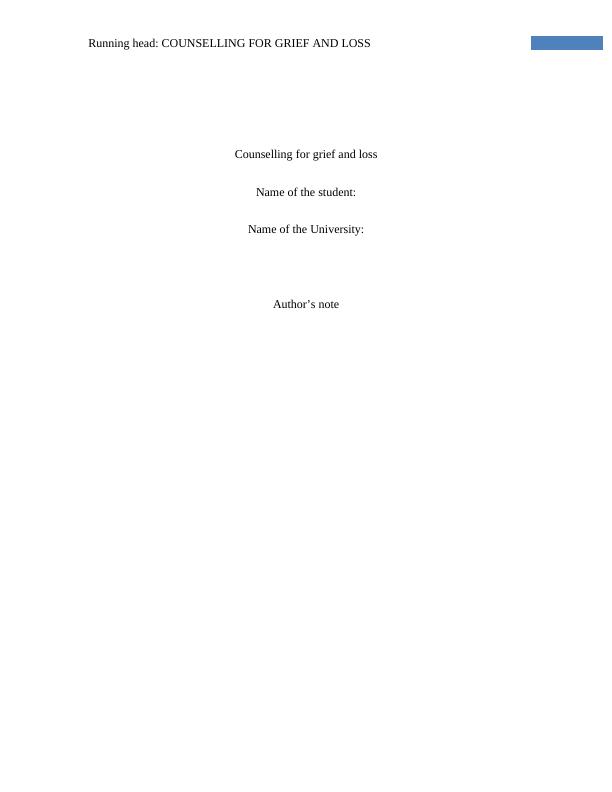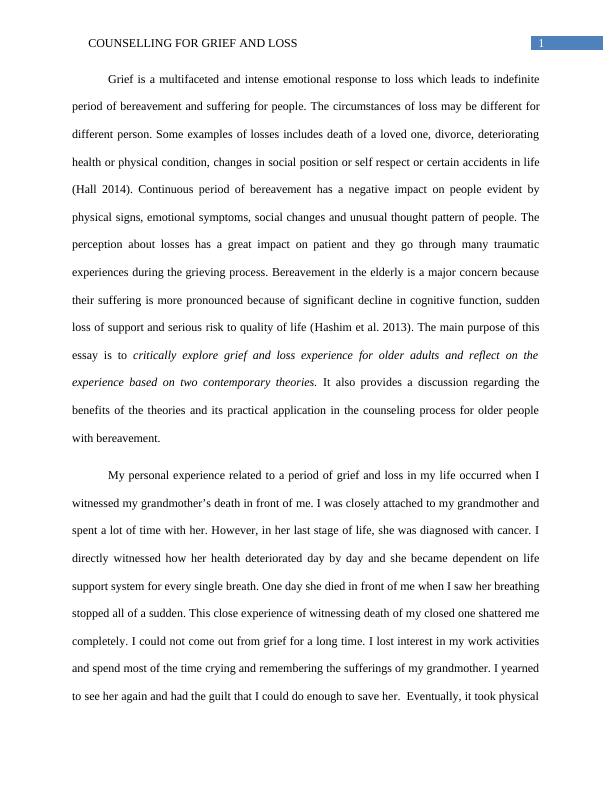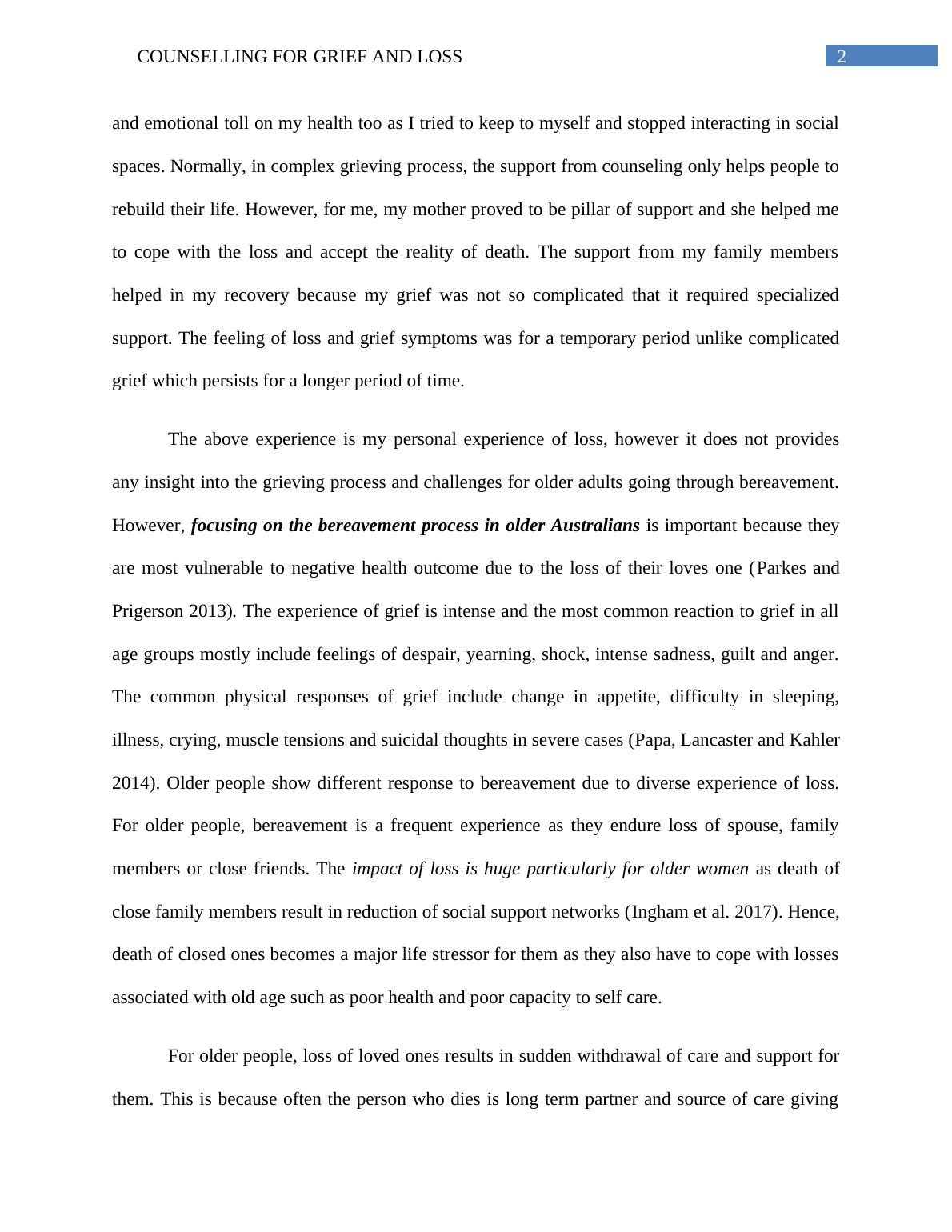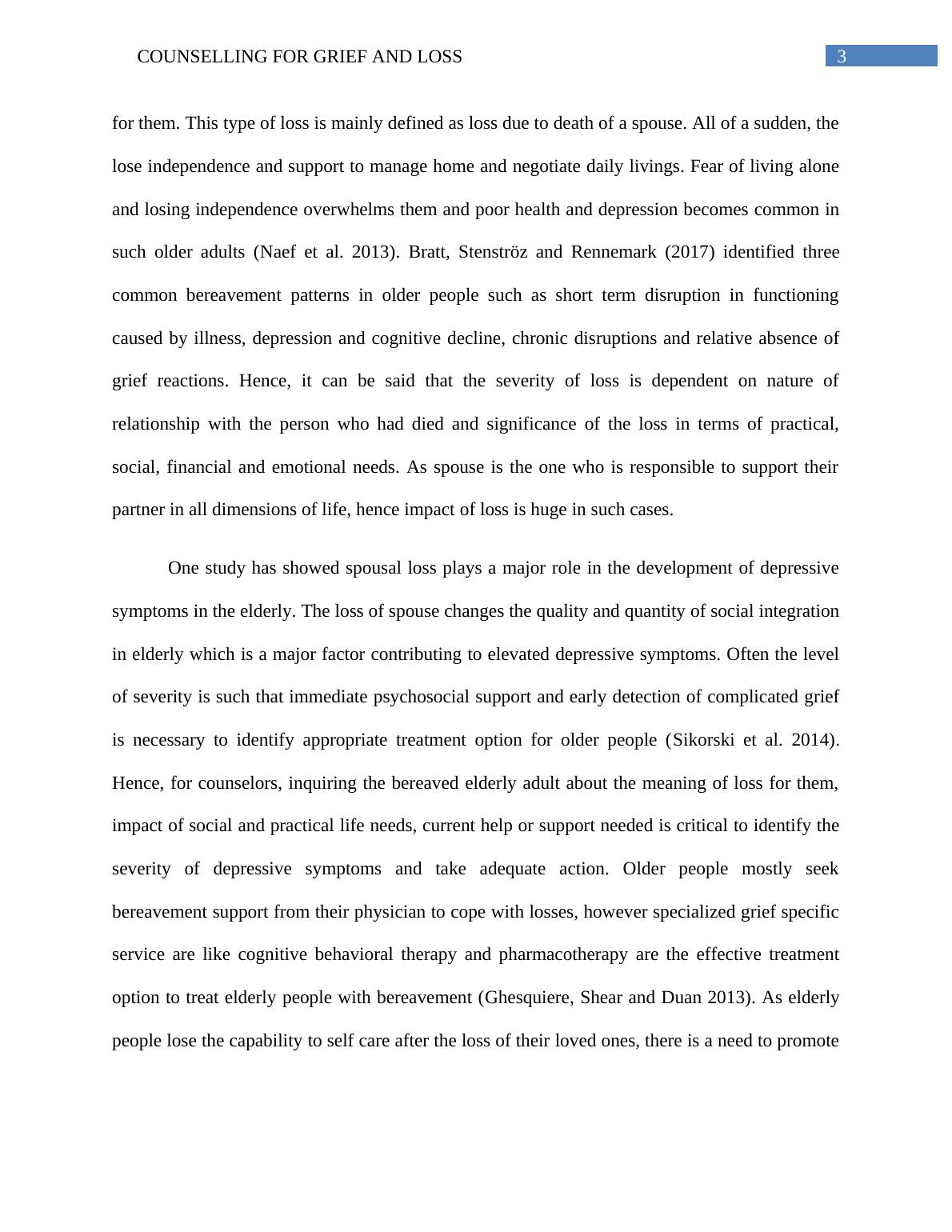COU302A: Counselling for Grief and Loss
Added on 2020-05-04
12 Pages3658 Words1416 Views
Running head: COUNSELLING FOR GRIEF AND LOSSCounselling for grief and lossName of the student:Name of the University:Author’s note

1COUNSELLING FOR GRIEF AND LOSSGrief is a multifaceted and intense emotional response to loss which leads to indefiniteperiod of bereavement and suffering for people. The circumstances of loss may be different fordifferent person. Some examples of losses includes death of a loved one, divorce, deterioratinghealth or physical condition, changes in social position or self respect or certain accidents in life(Hall 2014). Continuous period of bereavement has a negative impact on people evident byphysical signs, emotional symptoms, social changes and unusual thought pattern of people. Theperception about losses has a great impact on patient and they go through many traumaticexperiences during the grieving process. Bereavement in the elderly is a major concern becausetheir suffering is more pronounced because of significant decline in cognitive function, suddenloss of support and serious risk to quality of life (Hashim et al. 2013). The main purpose of thisessay is to critically explore grief and loss experience for older adults and reflect on theexperience based on two contemporary theories. It also provides a discussion regarding thebenefits of the theories and its practical application in the counseling process for older peoplewith bereavement. My personal experience related to a period of grief and loss in my life occurred when Iwitnessed my grandmother’s death in front of me. I was closely attached to my grandmother andspent a lot of time with her. However, in her last stage of life, she was diagnosed with cancer. Idirectly witnessed how her health deteriorated day by day and she became dependent on lifesupport system for every single breath. One day she died in front of me when I saw her breathingstopped all of a sudden. This close experience of witnessing death of my closed one shattered mecompletely. I could not come out from grief for a long time. I lost interest in my work activitiesand spend most of the time crying and remembering the sufferings of my grandmother. I yearnedto see her again and had the guilt that I could do enough to save her. Eventually, it took physical

2COUNSELLING FOR GRIEF AND LOSSand emotional toll on my health too as I tried to keep to myself and stopped interacting in socialspaces. Normally, in complex grieving process, the support from counseling only helps people torebuild their life. However, for me, my mother proved to be pillar of support and she helped meto cope with the loss and accept the reality of death. The support from my family membershelped in my recovery because my grief was not so complicated that it required specializedsupport. The feeling of loss and grief symptoms was for a temporary period unlike complicatedgrief which persists for a longer period of time. The above experience is my personal experience of loss, however it does not providesany insight into the grieving process and challenges for older adults going through bereavement.However, focusing on the bereavement process in older Australians is important because theyare most vulnerable to negative health outcome due to the loss of their loves one (Parkes andPrigerson 2013). The experience of grief is intense and the most common reaction to grief in allage groups mostly include feelings of despair, yearning, shock, intense sadness, guilt and anger.The common physical responses of grief include change in appetite, difficulty in sleeping,illness, crying, muscle tensions and suicidal thoughts in severe cases (Papa, Lancaster and Kahler2014). Older people show different response to bereavement due to diverse experience of loss.For older people, bereavement is a frequent experience as they endure loss of spouse, familymembers or close friends. The impact of loss is huge particularly for older women as death ofclose family members result in reduction of social support networks (Ingham et al. 2017). Hence,death of closed ones becomes a major life stressor for them as they also have to cope with lossesassociated with old age such as poor health and poor capacity to self care. For older people, loss of loved ones results in sudden withdrawal of care and support forthem. This is because often the person who dies is long term partner and source of care giving

3COUNSELLING FOR GRIEF AND LOSSfor them. This type of loss is mainly defined as loss due to death of a spouse. All of a sudden, thelose independence and support to manage home and negotiate daily livings. Fear of living aloneand losing independence overwhelms them and poor health and depression becomes common insuch older adults (Naef et al. 2013). Bratt, Stenströz and Rennemark (2017) identified threecommon bereavement patterns in older people such as short term disruption in functioningcaused by illness, depression and cognitive decline, chronic disruptions and relative absence ofgrief reactions. Hence, it can be said that the severity of loss is dependent on nature ofrelationship with the person who had died and significance of the loss in terms of practical,social, financial and emotional needs. As spouse is the one who is responsible to support theirpartner in all dimensions of life, hence impact of loss is huge in such cases. One study has showed spousal loss plays a major role in the development of depressivesymptoms in the elderly. The loss of spouse changes the quality and quantity of social integrationin elderly which is a major factor contributing to elevated depressive symptoms. Often the levelof severity is such that immediate psychosocial support and early detection of complicated griefis necessary to identify appropriate treatment option for older people (Sikorski et al. 2014).Hence, for counselors, inquiring the bereaved elderly adult about the meaning of loss for them,impact of social and practical life needs, current help or support needed is critical to identify theseverity of depressive symptoms and take adequate action. Older people mostly seekbereavement support from their physician to cope with losses, however specialized grief specificservice are like cognitive behavioral therapy and pharmacotherapy are the effective treatmentoption to treat elderly people with bereavement (Ghesquiere, Shear and Duan 2013). As elderlypeople lose the capability to self care after the loss of their loved ones, there is a need to promote

End of preview
Want to access all the pages? Upload your documents or become a member.
Related Documents
Report on Counselling for Grief and Losslg...
|10
|2727
|237
Counselling for Grief and Losslg...
|10
|2747
|53
Grief and Bereavement in the Adult Palliative Carelg...
|9
|2658
|246
Counseling and Loss: Personal Experience and Professional Practicelg...
|9
|2736
|416
Mental Illness and Problemslg...
|11
|2697
|166
Reflection on Death, Dying, and Illness in Nursing Practicelg...
|5
|1279
|461
